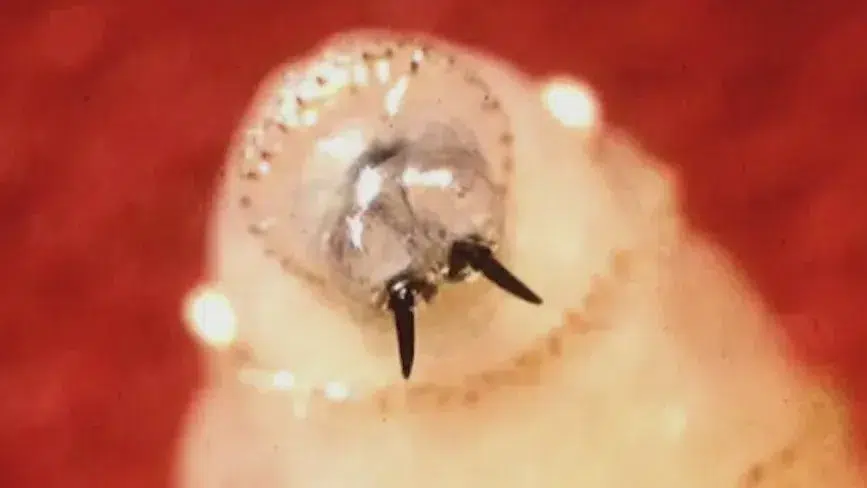
No Time To Screw Around With The Screwworm
There’s no rest for the weary when it comes to border security. While Trump works to undo the invasion that the Biden administration created, a new threat has reared its ugly head that must be dealt with swiftly to circumvent disaster.
A bipartisan group of lawmakers, led by U.S. Senator John Cornyn, has introduced new legislation to stop the spread of the New World screwworm, a parasitic pest that threatens the U.S. cattle industry.
The Strengthening Tactics to Obstruct the Population of Screwworms (STOP Screwworms) Act authorizes federal funding for the U.S. Department of Agriculture to construct a new facility for producing sterile flies. This initiative aims to reduce the increasing population of screwworms approaching the U.S. southern border.
According to Cornyn:
“Combatting the destructive New World screwworm is vital to protecting our cattle, Texas producers, and the American livestock industry as a whole. I am proud to lead this legislation to create a new facility dedicated to pushing these pests away from our border.”
The legislation has garnered bipartisan support, with co-sponsorship from Senators Ted Cruz, Ben Ray Luján, Martin Heinrich, and Cindy Hyde-Smith, as well as Representative Tony Gonzales, who introduced the corresponding House bill.
Gonzales added:
“Ag producers across America are sounding the alarm — the New World screwworm is making a comeback, and our livestock industry is in real danger. The STOP Screwworms Act provides dedicated resources to do just that.”
For those of you who were in the dark about this pest (like me), here’s a little enlightenment. The New World screwworm is a parasitic fly whose larvae infest and feed on warm-blooded animals, such as livestock and wildlife, and in rare cases, humans. If left untreated, infestations can be deadly. Recently, the USDA suspended live animal imports at the southern border due to increasing outbreaks in Mexico.
Need more? Yuck. The term “screwworm” describes the maggots’ feeding behavior as they burrow into wounds, similar to how a screw is driven into wood.
The maggots can cause significant damage by tearing into tissue with their sharp mouth hooks. As more maggots hatch and feed on living tissue, the wounds can deepen, leading to potentially fatal consequences. Adult screwworm flies are slightly larger than common houseflies, featuring orange eyes, metallic blue or green bodies, and three dark stripes on their backs.
The USDA encourages individuals to report any mammals and birds exhibiting the following signs:
- Irritated behavior
- Head shaking
- Smell of decay
- Fly strike (visible larvae or maggots in wounds)
- Smell of decay
- Head shaking
Senator Luján cautioned that the outbreak directly threatens New Mexico’s 1.4 million cattle and over 10,000 ranches.
“Congress must take immediate action. This is a critical investment that saves the U.S. livestock industry nearly $1 billion each year.”
The proposed facility will use the sterile insect technique, which involves releasing sterilized male flies into affected areas to disrupt reproduction. This method successfully eliminated screwworms from the U.S. in the 1960s and from Mexico in the 1990s.
A female screwworm fly has a maximum lifespan of just 30 days. Since she only has one opportunity to mate during this brief period, mating with a sterile male ensures that her lineage ends there. Without offspring, there is no potential for spread. Each female can lay up to 3,000 flesh-eating larvae, so disrupting this reproductive cycle is crucial for stopping the outbreak.
For the plan to be effective, flights to disperse sterile male flies must be consistent and daily. Mexico is aware of this, yet it has still imposed restrictions, limiting USDA sterile fly dispersal flights and implementing customs duties on necessary tools, such as plane parts, fly shipments, and dispersal equipment. This has delayed every aspect of the operation. It’s important to consider that, as a deadly parasite creeps closer to our border, the Mexican government is placing financial burdens on the planes and tools we need to combat it. This is not cooperation; it’s sabotage.
In response to a growing threat, the United States has recently suspended imports of cattle, horses, and bison from Mexico. This step was necessary due to the return of this silent, flesh-eating invader. That said, Mexican President Claudia Sheinbaum has audaciously called the 15-day import suspension “unfair.”
Based on Sheinbaum’s belligerent stance, it’s obvious that the screwworm isn’t the only parasite that wants to “screw” America. One we can handle with sterile flies, the other still needs strict diplomacy.



